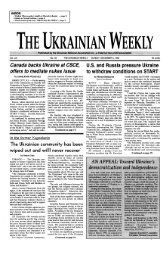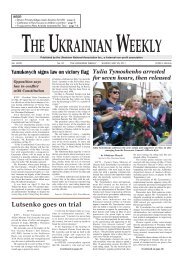Solemn march recalls 10 million victims of Holodomor
Solemn march recalls 10 million victims of Holodomor
Solemn march recalls 10 million victims of Holodomor
You also want an ePaper? Increase the reach of your titles
YUMPU automatically turns print PDFs into web optimized ePapers that Google loves.
22 THE UKRAINIAN WEEKLY SUNDAY, NOVEMBER 25, 2007<br />
No. 47<br />
LETTERS TO THE EDITOR<br />
Ukrainians’ skepticism...<br />
(Continued from page 6)<br />
servative theoreticians. A farm worker’s<br />
life is better in Europe; for instance, in<br />
Germany with its strong family farm tradition.<br />
Worldwide, large assets tend to be<br />
accumulated in very few hands. Here are<br />
some statistics. One-half <strong>of</strong> all the assets<br />
on this planet is owned by 2 percent <strong>of</strong> the<br />
world’s population. The lower one-half <strong>of</strong><br />
the world’s population owns only 1 percent<br />
<strong>of</strong> the world’s assets (per the<br />
Financial Times, December 6, 2006). It’s<br />
nice to be in the top 2 percent, unless you<br />
are overly concerned about all those<br />
slackers. Guess where most Ukrainian<br />
peasants would fit after a perky land grab.<br />
Recently, Ukraine’s land issues were<br />
described for me by a 27-year-old graduate<br />
<strong>of</strong> Kyiv’s Agricultural University, with<br />
a degree in international business. For<br />
several years now she has worked as manager<br />
<strong>of</strong> a large food-producing farm<br />
owned by a French consortium on leased<br />
land in the Dnipropetrovsk area. The main<br />
reason Ukrainian peasants don’t start their<br />
own farms (aside from small vegetable<br />
gardens) is the lack <strong>of</strong> initial capital.<br />
Banks in Ukraine don’t readily lend<br />
money to “small fry.” Land cannot be<br />
<strong>of</strong>fered as collateral. Hence, land reform<br />
without a “banking revolution” and a host<br />
<strong>of</strong> other issues to be resolved – including<br />
massive tax dodging by big and small<br />
business – is a dead duck.<br />
The existing system is actually not all<br />
bad. People can get income by leasing<br />
their land to entrepreneurs, and also can<br />
work there for pay. This becomes similar<br />
to pr<strong>of</strong>it-sharing. In contrast, the bulk <strong>of</strong><br />
Ukraine’s big-time industrial enterprises<br />
have slipped away from ethnic Ukrainian<br />
hands. This is not surprising. Unfettered<br />
capitalism is usually at loggerheads with<br />
the national interest in any country.<br />
Boris Danik<br />
North Caldwell, N.J.<br />
Inaccurate information<br />
in Shukhevych article<br />
Dear Editor:<br />
Here, in the Kuwait-Iraq Theater, I<br />
received the August 26 issue <strong>of</strong> The<br />
Ukrainian Weekly and want to express<br />
some views on the article about Gen.<br />
Roman Shukhevych written by Zenon<br />
Zawada.<br />
It is very good that my attorney friend,<br />
Askold Lozynskyj, is suing Ukraine’s<br />
Communist Party over its defamation <strong>of</strong><br />
Gen. Shukhevych <strong>of</strong> the Ukrainian<br />
Insurgent Army (UPA). And clearly, Mr.<br />
Zawada’s story reveals Soviet-era influences.<br />
But most importantly, he made<br />
some serious mistakes which must be<br />
corrected.<br />
The unit known as the Nachtigall<br />
Battalion in which Shukhevych briefly<br />
served was never a “Ukrainian auxiliary<br />
police” battalion. Raised in late 1939, the<br />
Nachtigall unit was strictly a combat<br />
infantry battalion. Initially Gen.<br />
Shukhevych served as a company commander<br />
in Nachtigall, but just before<br />
Operation Barbarossa (Hitler’s attack on<br />
the Soviet Union in June 1941) he was<br />
appointed as its commander. Protesting<br />
Nazi Germany’s harsh policies toward<br />
Ukraine, the unit’s personnel began to<br />
revolt and desert. Amongst them was<br />
Gen. Shukhevych. Relieved <strong>of</strong> command<br />
by German authorities and arrested, Gen.<br />
Shukhevych fled and entered the<br />
Ukrainian underground. In October<br />
1942, the various Ukrainian guerrilla<br />
bands were merged into one army – the<br />
UPA. Shortly after, Shukhevych was<br />
appointed the commander <strong>of</strong> this anti-<br />
Nazi and anti-Soviet guerrilla army.<br />
As for Hitler, he rarely issued an iron<br />
cross to a military man, as Soviet sources<br />
allege. By and large, iron crosses were<br />
personally issued from the battalion to<br />
divisional level by its commanders or,<br />
these commanders designated their platoon<br />
and company commanders to issue<br />
the award. The medal which Hitler<br />
issued in person was the Knight’s Cross<br />
with Diamonds. Very few <strong>of</strong> these were<br />
issued and the book which I have on the<br />
military men who won this medal does<br />
not include Gen. Shukhevych. Yurii<br />
Lopatynskyi never “led an SS division in<br />
Vinnytsia.” In World War II, no<br />
Ukrainian ever commanded any kind <strong>of</strong><br />
SS Police unit, or any kind <strong>of</strong> division<br />
whether it be a Waffen SS, Wehrmacht,<br />
Luftwaffe or Army Field Security. As for<br />
Lopatynskyi, I believe he served in the<br />
UPA. As for the Iron Cross and the<br />
Knight’s Cross, foreign soldiers could<br />
receive these awards as well. A number<br />
<strong>of</strong> Ukrainian soldiers serving in the 14th<br />
Waffen SS Galicia Division, for example,<br />
did receive Iron Crosses. And on<br />
September 26, 1944, 33 Ukrainian<br />
Galicia Division soldiers received the<br />
Distinguished War Service Cross, 2nd<br />
Class. In itself, this award was a higher<br />
cross <strong>of</strong> valor.<br />
One <strong>of</strong> the most intriguing recipients<br />
<strong>of</strong> the Iron Cross was Sven Hassel. A<br />
Danish communist arrested and imprisoned<br />
in Germany, Hassel was placed into<br />
the 27th Mechanized Penal Battalion.<br />
The entire unit was composed <strong>of</strong><br />
Communists, criminals, murderers, drug<br />
dealers, homosexuals, sex <strong>of</strong>fenders,<br />
gangsters – as Hassel wrote, “the scum<br />
<strong>of</strong> the earth.” Each and every one hated<br />
Hitler. Yet, they fought for him like lions<br />
on the Russian front. Hassel survived the<br />
war. His book “Wheels <strong>of</strong> Terror!” is a<br />
monumental work and the book has gone<br />
through numerous publications. But at<br />
least Hassel, unlike Petro Symonenko<br />
and all <strong>of</strong> those other Ukrainian<br />
Communists who never helped anyone<br />
and always lived high lifestyles on the<br />
suffering <strong>of</strong> their fellow countrymen,<br />
donated all <strong>of</strong> his money to charitable<br />
organizations and the environment.<br />
Lt. Col. Michael O. Logusz<br />
U.S. Army<br />
Camp Arifjan, Kuwait<br />
Is big brother...<br />
(Continued from page 2)<br />
Cabinet to withdraw resolution No. 1169<br />
as soon as possible. The association’s<br />
chairwoman, Tetiana Popova, said the<br />
resolution violated the Constitution and<br />
the principle <strong>of</strong> supremacy <strong>of</strong> law. The<br />
association has sent letters to the Justice<br />
Ministry, the Procurator General’s Office,<br />
the Supreme Court and President Viktor<br />
Yushchenko, urging them to intervene.<br />
Ekonomichna Pravda quoted<br />
Sviatoslav Oliynyk, who chaired the outgoing<br />
Parliament’s subcommittee for<br />
monitoring law-enforcement bodies, as<br />
saying that Resolution No. 1169 is legally<br />
nonsensical, as it grants the secret<br />
services greater access to private information<br />
than the Constitution permits. He<br />
also noted that the resolution does not<br />
clearly specify which state bodies are<br />
entitled to obtain such information, so in<br />
theory any <strong>of</strong>ficial could try to get it.<br />
Volodymyr Yavorskyi, executive<br />
director <strong>of</strong> the Ukrainian Helsinki<br />
Human Rights Union, noted that citizens<br />
may not appeal against Resolution No.<br />
1169 in court. This is because only the<br />
Constitutional Court is entitled to rule on<br />
Cabinet resolutions and laymen cannot<br />
appeal to that court. He said the Helsinki<br />
Union would ask President Yushchenko<br />
to suspend the resolution and to file an<br />
appeal with the Constitutional Court.<br />
Mr. Yavorskyi noted, however, that<br />
resolution No. 1169 is nothing new as far<br />
as the Internet is concerned. The resolution<br />
apparently only restored powers to<br />
special services that they had had until<br />
2006, when the Justice Ministry cancelled<br />
the Communications Committee’s<br />
special order under which communication<br />
operators had been obliged to give<br />
confidential information about clients to<br />
special services.<br />
Human rights expert Viktor Chevhuz<br />
told Segodnya that the real novelty is<br />
that the special services are now allowed<br />
to secretly enter private premises. “In the<br />
past, the law on search and data collection<br />
did not allow operatives to secretly<br />
enter living premises or <strong>of</strong>fices. Now<br />
they [have] obtained this right,” said Mr.<br />
Chevhuz.<br />
The Helsinki Union told Ukrayinska<br />
Pravda that about 40,000 writs to access<br />
private information was issued in<br />
Ukraine in 2004 alone, compared with<br />
some 3,000 such writs issued in the<br />
United States that year. Ukrayinska<br />
Pravda suggested that such a disproportionate<br />
number <strong>of</strong> permissions were<br />
issued in Ukraine not to catch potential<br />
terrorists or watch opposition politicians,<br />
but rather to spy on business rivals.<br />
“The state here needs the special services<br />
not to execute control over citizens,<br />
but first <strong>of</strong> all to help the feudal-industrial<br />
clans fight each other,” Ukrayinska<br />
Pravda summed up.<br />
Acting Internal Affairs Minister<br />
Mykhailo Kornienko, however, thinks<br />
that Resolution No. 1169 is nothing special.<br />
He told Segodnya that the resolution<br />
only systematized the procedures that<br />
existed before. “We [the police], the<br />
SBU, the Border Service and other agencies<br />
involved in investigation each had<br />
our own internal instructions on this. The<br />
Cabinet resolution established a common<br />
procedure,” he said. “It is not aimed at<br />
eavesdropping on everybody or total<br />
spying. It is stupid and provocative to<br />
claim that!” he declared.<br />
Sources: Korrespondent.net, October<br />
26; Ekonomichna Pravda, October 31;<br />
Ukrayinska Pravda, Segodnya, November<br />
2; Zerkalo Nedeli, November 3.

















